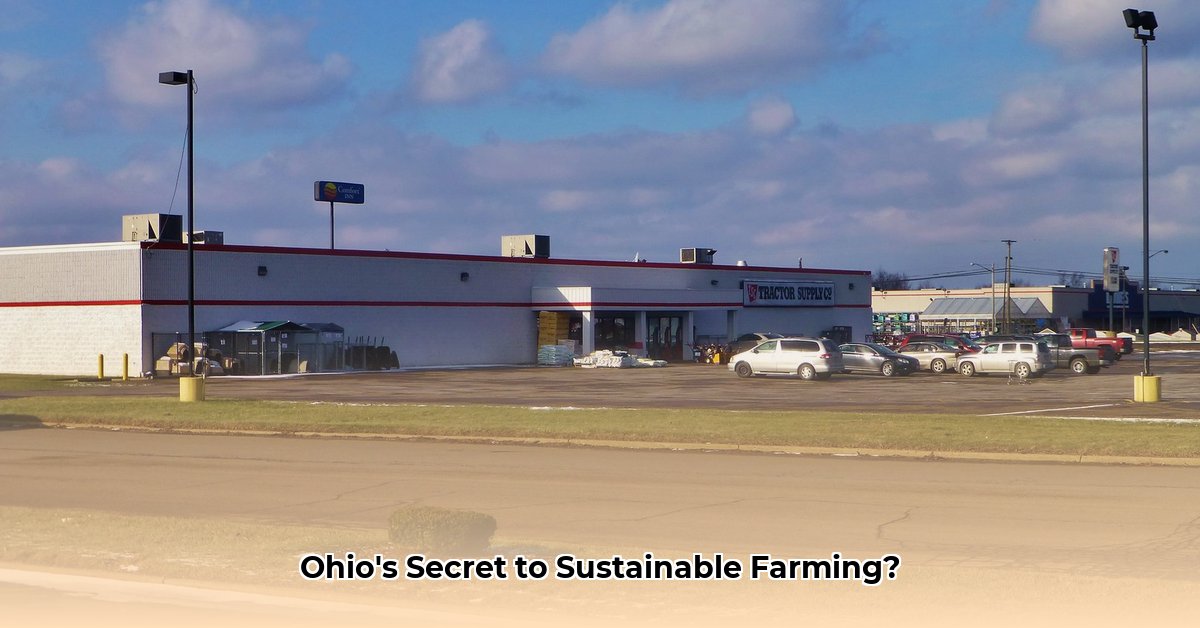
Tractor Supply's Role in Ohio's Sustainable Agriculture
Tractor Supply Company (TSC) in Alliance, Ohio, plays a significant, albeit indirect, role in supporting sustainable agriculture within the community. While the store offers a wide array of products conducive to environmentally friendly farming practices, a comprehensive assessment of its overall sustainability impact requires more transparent data. This article examines TSC’s product offerings, analyzes its current contributions to sustainable farming, and proposes strategies for enhancing its positive influence. For more information on TSC's equipment offerings, check out their rototiller selection.
TSC's Product Range: Supporting Sustainable Practices
The Alliance, Ohio Tractor Supply store provides a diverse selection of products catering to various sustainable farming needs. Customers can find organic seeds (a growing sector in the market), a range of tools suitable for efficient and less resource-intensive farming methods, and natural pest control options. The availability of organic livestock feed further emphasizes the store’s potential for supporting environmentally conscious animal husbandry. This broad range, in theory, empowers customers to implement sustainable practices. However, the reality of its impact hinges on consumer choices and TSC's own sustainable initiatives.
Analyzing TSC's Sustainability Impact: Data Gaps and Opportunities
While TSC's product assortment could significantly support sustainable farming, assessing its actual impact presents challenges. The company's current contribution is largely indirect, reliant on customer choices and responsible purchasing behaviors. Crucially, data regarding TSC's supply chain practices, transportation emissions, and the overall environmental footprint of its products are lacking. This lack of transparency hinders a comprehensive evaluation of its true sustainability contribution. More information is needed. For instance, independent life cycle assessments (LCAs) – analyzing the complete product lifecycle from origin to disposal – would provide much more quantifiable data. Would such an assessment reveal significant impacts?
Key Takeaways:
- TSC's current sustainability impact is largely determined by consumer choices.
- A lack of transparency regarding supply chain and environmental footprint data limits a full assessment.
- Opportunities exist for TSC to become a leader in promoting sustainable agricultural practices.
Enhancing TSC's Sustainability Leadership: A Roadmap for Improvement
To maximize its positive impact, TSC should actively pursue several strategic improvements. Firstly, forming partnerships with prominent sustainable agriculture organizations would lend credibility to its sustainability efforts. Secondly, investing in customer education through workshops, online resources, and in-store signage promoting sustainable practices would empower consumers to make more informed choices. Finally, and perhaps most importantly, increasing transparency in its supply chain by publicly reporting data on its environmental footprint would foster greater trust and accountability.
Actionable Steps for TSC:
- Conduct Life Cycle Assessments (LCAs): Assess the environmental impact of key product lines, providing a quantifiable measure of their sustainability. Efficacy Metric: Reduce environmental impact by 15% in 3 years.
- Partner with Sustainability Organizations: Collaborate with established organizations to improve sourcing, product development, and customer education. Efficacy Metric: Increase adoption of sustainable products by 20% within 2 years.
- Develop Educational Resources: Create readily accessible content (online guides, in-store displays) that educate customers on sustainable farming techniques. Efficacy Metric: Increase customer awareness of sustainable practices by 30% within 1 year.
- Increase Supply Chain Transparency: Publish annual reports detailing sourcing practices, transportation methods, and the overall environmental footprint of its operations. Efficacy Metric: Increase consumer trust and brand loyalty by 10% in 2 years.
Consumer Action: Driving Demand for Sustainability
Consumers hold significant influence. By prioritizing organic and sustainably sourced products, actively seeking certifications verifying sustainability standards (like USDA Organic), and paying closer attention to packaging materials, consumers can directly signal their preference for environmentally friendly options, driving market demand for sustainable agricultural practices. This active participation is critical in supporting the growth of the sector.
Conclusion: A Collaborative Path to Sustainable Farming
Tractor Supply Company in Alliance, Ohio, possesses the potential to play a much larger role in supporting sustainable farming. However, realizing this potential requires increased transparency, proactive engagement with sustainability initiatives, and the concerted effort of consumers to make informed choices. Through a collaborative approach involving TSC, consumers, and sustainable agriculture organizations, a truly impactful and sustainable agricultural future can be cultivated in Ohio and beyond.